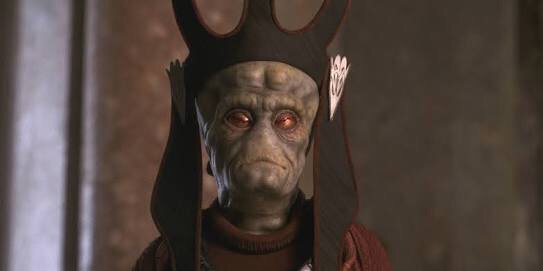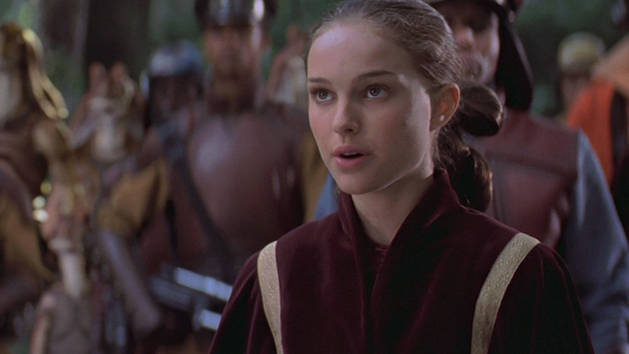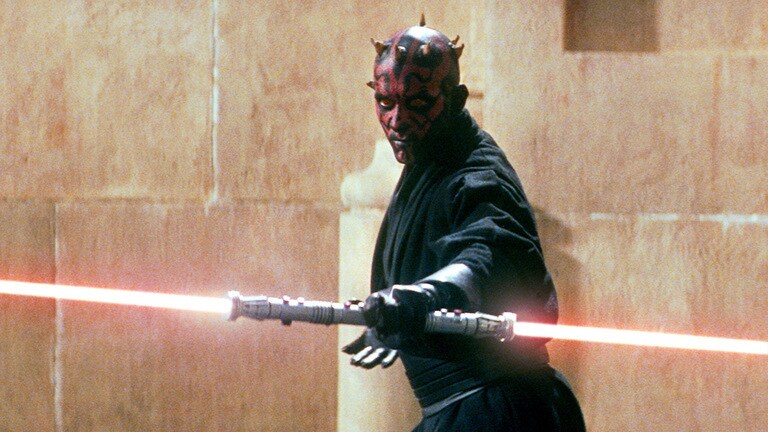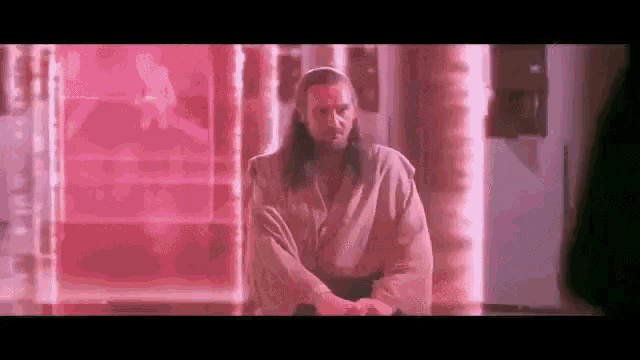And so the beginning of the end of Episode I is exactly what the beginning was: a negotiation. Only this time Padme is ready to put herself on the line. Her honest pleas for help somehow convince the otherwise unhelpful Boss Nass and he chips in everything he's got.
For those of you who are wondering why Qui-Gon didn't just mind trick Boss Nass into helping them (cough cough anyone who's watched Red Letter Media's stuff), let's look at not only the effectiveness of Mind Trick in general but who Qui-Gon is as a character. First off, Mind Trick isn't necessarily a good long-term idea. It doesn't protect you from the backlash of other people who were not mind-tricked, for instance, as poor Bib Fortuna will find out in Episode VI. Padme needs a long term ally should this whole war thing work. Diplomatically speaking, a mind trick is kinda against everyone's self interests. Second off, a mind trick doesn't seem to do anything more than what the victim wants on an unconscious level. Stormtroopers don't want to be looking for stupid droids, people selling deathsticks really may want to go home and rethink their lives, and money is money is money. Part of what makes Watto such a miserable character is he genuinely doesn't care about helping people, he literally only wants money. You can't make someone give you something that they don't want to. If anyone has any knowledge of canon to the contrary please let me know, but from watching the films it isn't obvious that these "tricks" wouldn't have worked without more time to begin with. The Force merely sped the process up.
And, once again, we return to who Qui-Gon is as a person: the interpreter of patterns. Padme has changed and she's doing something that Qui-Gon openly says he doesn't understand. It's really the ultimate test of Qui-Gon's ENFP-ness: what do you do with a totally unknown puzzle? Sit back until the pieces reveal themselves. Which is what Qui-Gon does, urging Obi-Wan to follow suit. Much as these two disagree Obi-Wan is loyal.
The narrative then splits into four pieces: the battle above on the fake "planet", the battles in the castle, and the battle on the field. Everything's shot well, it's not like I need to tell you that the fighting is enjoyable. But then something happens that's.... odd. Just as everything is lost...
 |
| This dude is captured by Padme. |
 |
| Anakin accidentally blows up The Trade Federation ship. |
 |
| The droids fall |
 |
| What, you thought these were all unrelated? |
Looks like that paid off. Everyone, acting together, was enabled by the Force to win. Or did you think the line in The Return of the Jedi "May the Force be with us" was just a throw-away? But this is not something that us Westerners decode normally. Star Wars is far from the only myth to put in a single line in the middle of a conversation that is indirectly referenced throughout the rest of the work. As an example, understanding the Bible is entirely predicated on realizing that it's not a bunch of a random books put together in an interesting order but realizing that each and every word is situated on purpose and is a cohesive whole that formulates inside your heart, not on the page. Mythology is the blue-print. You are the building.
Before we leave this moment of happiness and return to the narrative, I feel that Qui-Gon's death needs to be addressed, because this is the first moment we really start to understand that Star Wars communicates backwards as well as forwards. Events later in the story inform us of what's going on in past scenes. Qui-Gon sits down to meditate.
And in all three they become immortal.
No, I don't think Qui-Gon's just sitting down to meditate. This is the dude who said to keep yourself in the moment, remember? And his act of concentration is incredibly similar to Obi-Wan's, with one exception: Qui-Gon doesn't sacrifice himself. He's killed. We'll get back to why that's important later, but suffice it to say, Qui-Gon tried to do what Obi-Wan did later, and Han's last act of love further torments his son with his ever present memory. In a way Han achieves immortality in a way the others never will.
The movie ends with a negotiation. Yoda, stuck in his ways, refuses to let change happen with grace, which I suppose makes sense considering he's 900 years old. But the worst part is that the guy who should not be training Anakin is doing so. Obi-Wan has the emotional maturity of all his 25 years. He's bought the BS of the fallen Jedi Order, which makes him ill-equipped to deal with Anakin. And, looking at Anakin later, you realize that Anakin knows it too. Big deal that Anakin (in his mind) single-handedly destroyed a Droid Federation ship! Qui-Gon, the man who had faith in him and unlocked his power, is dead. He's stuck with the jerk who openly said right in front of him that he's dangerous, his mother's still on Tatooine, and Padme not only lied to him (Shmi is the ONLY person besides Luke and Qui-Gon who don't) but she's gone too!
 |
| Not really elated, no. |
But Episode 1's completely worthless to the story! Totally OK to skip!
Addendum: I realized that I forgot to address why Obi-Wan didn't "Force Rush" towards Qui-Gon to help him out with Darth Maul. The Force takes a physical toll on whoever uses it, no matter if they're using Dark and Light approaches. Only those with a lot of experience in the Force could generally string together Force Powers, and even then it took an effort. Obi-Wan is not even a Jedi yet. And right before he'd used a Force Jump. It's notable that never, at any point, does Obi-Wan ask why he doesn't use the power. He never seems to regret not putting on another burst of speed because it was simply beyond him to do so.
At least, that's the understanding of it I have. Feel free to correct me if I'm wrong.






No comments:
Post a Comment